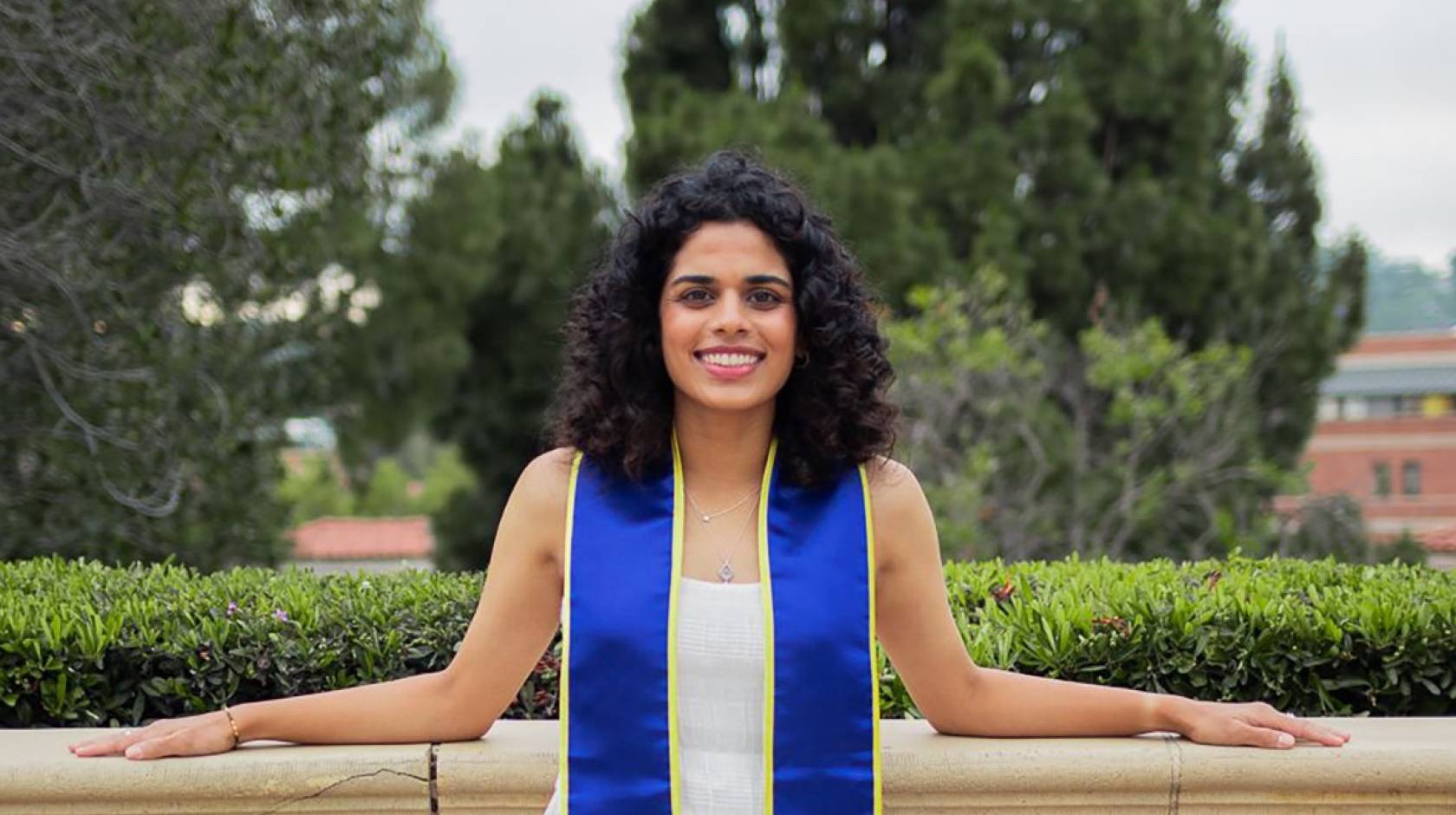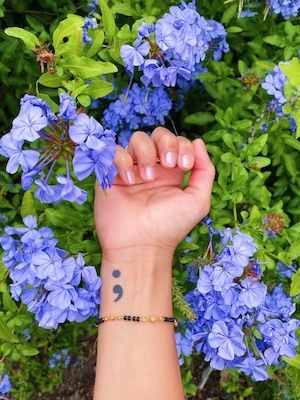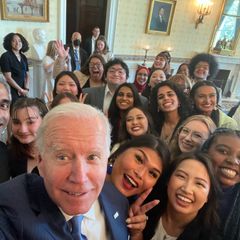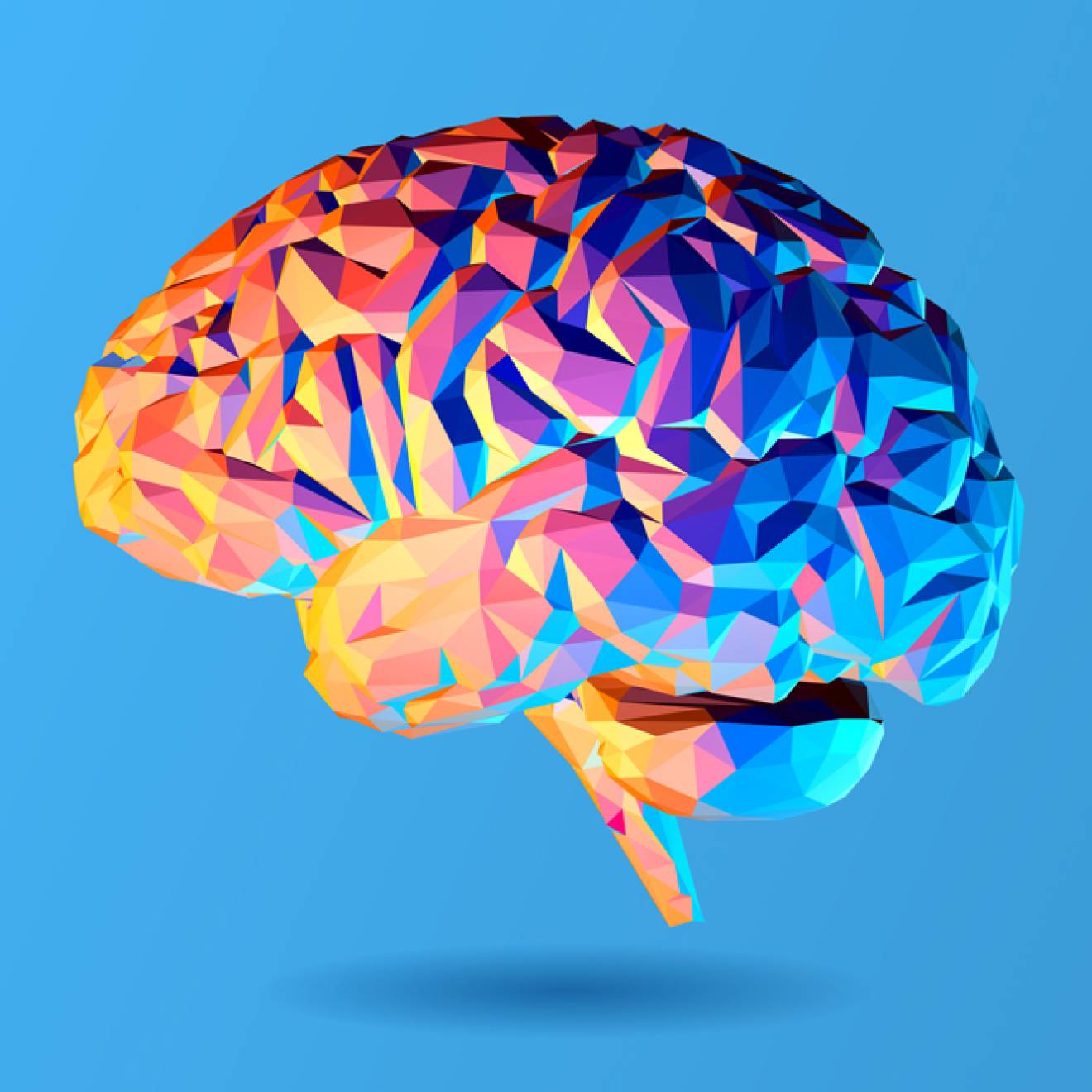Madeline Adamo, UCLA

In English, her first language, Meera Varma has found the words to advocate for mental health at the White House, at school board meetings in her hometown of Burbank, on UCLA’s campus and as a youth ambassador for Lady Gaga’s Born This Way foundation.
Her words have had an impact. They led Burbank schools to print the number of a suicide prevention hotline on all grade 6–12 student ID cards and to Varma, 22, being named to the board of the Friends of the Semel Institute for Neuroscience and Human Behavior at UCLA, where she advises members on new mental health education programs for youth.
But reaching members of her local Indian community, including older members of her family, was always a challenge for Varma, especially in high school. Because of the language barrier, she couldn’t properly explain the daily anxiety attacks she was having in class or, later, her thoughts of suicide. Google Translate provided little help.
“There wasn’t even a word for ‘stigma’ in Hindi, so I didn’t have those conversations growing up,” said Varma, who earned her bachelor’s in psychology at UCLA in 2022 and is now pursuing graduate studies in social welfare at the UCLA Luskin School of Public Affairs. “I was experiencing a lot of mental health challenges, but I didn’t have any words to express it.”
She would eventually overcome that hurdle, but it wasn’t before she first gained a better understanding of her own experience of mental illness.
While looking at potential universities during high school, Varma learned that UCLA had one of the largest chapters of Active Minds, a nonprofit that promotes mental health among young people and has a presence at more than 600 colleges and high schools. It was part of why she chose UCLA.
During her freshman year, Varma served on Active Minds UCLA’s education committee, helping to coordinate campus events like networking nights between students and UCLA mental health experts, lectures and panels around mental health and domestic violence awareness, and self-care activities. Among her favorite programming activities was a session in which students smashed weight scales — a therapeutic way to make a statement about prioritizing mental health over body image.
“It was incredibly fun to be part of a community that normalizes conversations about mental health,” Varma said. “It was such a vulnerable space, but also a space of trust. I felt safe sharing my struggles because the students there were dedicated to making a change around how society views mental illness.”
It would be her work with Active Minds UCLA during her undergraduate years that eventually brought her White House. In the spring of 2022, Varma and 30 other student leaders from chapters across the county were invited to meet with First Lady Jill Biden, U.S. Surgeon General Vivek Murthy, and activist and artist Selena Gomez for an intimate fireside discussion about mental health.
Even President Joe Biden made a surprise appearance.
“I shared my story and my tattoo with him,” said Varma, who has a semicolon inked on her right wrist — a well-known symbol in the mental health community of the continuation of life and perseverance following a suicide-related event.
“I told him that I’m a person of color, that I’m a child of immigrants and that I’ve experienced a lot of intergenerational trauma because I did not grow up having these kinds of conversations,” she said.
At one point, the group asked President Biden if they could trust him to prioritize mental health. Varma said Biden explained how his administration is working to address the mental health crisis to give youth in particular a better future to live for.

Varma got her tattoo when she was 18 to symbolize overcoming mental health struggles.
Finding the words
Varma understands just how crucial talking honestly and openly about mental health is to educating people and erasing stigmas — so much so that she was willing to pick up another language just to reach the right audience.
During her sophomore year, she worked with her mom to learn enough Marathi — the primary language of the Indian state her family emigrated from — to give a presentation on mental health at her grandparents’ senior citizen center. With the seniors, many of whom were Indian immigrants, Varma was broaching a topic she wasn’t sure would be well received.
“India as a country has one of the highest rates of suicide in the world,” she said, and culturally, she noted, many Indians attribute mental illness only to stress. Seeing mental illness as a potential chemical imbalance is not widely embraced, she said, nor is the notion of taking medication to address anxiety and depression. Changing those types of entrenched perspectives is no easy task.
In the end, Varma was pleased, and perhaps a little surprised, that her older audience appeared open-minded, even asking her what signs they should be looking for to identify mental illness in themselves. “There’s still a lot of work to be done,” she said, “but I think through having these conversations, you help people understand.”
And Varma says she’s been lucky with how supportive her immediate family became once they began to understand her personal struggles. Her connections with the women in her life have been particularly healing, starting with her mother and grandmother. “A lot of my resilience and strength in addressing my mental health I owe to them. They have been my pillars of support,” she said.
A comeback story
Now back on campus for graduate school, Varma has been eager to connect in person with many of the upper division professors she’d known only through Zoom rectangles during the COVID-19 crisis. It was, she says, one of the reasons she chose UCLA over other programs.
Still, she stresses that even though she was sad to miss out on taking classes on campus during the pandemic, she was buoyed by the commitment faculty made to prioritizing mental health and student success. Her instructors, she said, fostered a strong culture of support among students, shared supplemental materials, allowed flexibility on assessments and gave students the chance to continue learning remotely even after campus reopened.
In particular, she remembers one professor making academic accommodations for students, many of whom were emotionally troubled, during the Jan. 6 Capitol riot, and another who was similarly considerate of students’ well-being during the tumultuous 2020 presidential election. Varma said she’s happy to be back at UCLA with faculty members like these.
“I just really wanted to come back so that I could learn more about my professors, just say ‘hi’ or even give them a hug,” she said. “I always felt very comforted and safe at UCLA and in a city where there's so much attention going towards the field of mental health.”

President Joe Biden snaps a selfie with Meera Varma and others attending the White House Mental Health Youth Action Forum in May 2022

